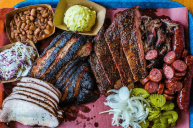Oh, superstitions. These little phrases certainly keep you on your toes, whether you're in the Deep South or in England. Not just for luck or wealth, you might be surprised to learn that there quite a few food superstitions that spell everything from bad luck to warding off the supernatural. While Americans, Southerners in particular, have contributed their fair share of food superstitions to the list, many of these are internationally recognized now.
The real question is, how many of these food superstitions do you secretly follow?
1. Bury bourbon at the site of your wedding before the ceremony to ward off unwanted rain.
Origin: Southern U.S.
Southerners have been saying variations of this phrase for decades, and about half of the time, it actually holds up. Also, Southerners seem to love burying bourbon. So how does it work?
Once you pick the spot of your upcoming nuptials, you and your betrothed best head right back there to bury a bottle of bourbon. This not to be confused with the Southern idea of burying bourbon on the day of your wedding to either dig up for your first fight or to celebrate your first year of marriage. We've heard all variations.
Pro Tip: Be a real Southerner and dig it up at the end of the reception for the wedding. That's a surefire way to have a restful night, right newlyweds?
2. Garlic wards off vampires and the curse of the evil eye.
Origins: Vampires, Bram Stoker of Dracula; Evil Eye, India/Greece
Garlic is such a common food superstition centerpiece, we have to imagine that Italians are naturally born repellant to vampires and the evil eye curse. Everyone knows that vampires hate garlic, though Bram Stoker was the first one to use the myth in a pervasive piece of culture enough for it to stick.
Many believe that garlic wards off vampires because the smell of garlic repels mosquitos. Vampires, like mosquitos, suck blood. As for the evil eye, garlic is, in general, believed to ward off evil, from a new bride on her wedding day to enemy forces in battle. The ancient Greeks, in particular, latched onto garlic as a supernatural (and natural) cure-all. And in India, garlic actually means 'Slayer of Monsters' in Sanskrit.
3. Never gift someone a knife because it represents 'cutting ties'.
Origin: Unknown/Universal
This particular superstition is found everywhere from Asia to South America to Europe to the United States. Apparently, if you want to sever a relationship with someone while also still getting them a gift (talk about passive aggressive behavior), a knife is the way to do it.
However, you can counter this with good luck by including a penny with the purchase in an effort to show the universe the person is "buying" their own knife.
4. If you cut open a loaf of bread with a big hole or bubble in the center, someone at the table will die soon.
Origin: England
How ominous, goodness. As if we didn't have enough to fear pre-vaccinations, we had to introduce folklore like this to our culture. I mean, how stressful is the grocery store already that your choice of bread is the curse that could kill someone you're having dinner with?
This isn't the only bread curse, either. Apparently in New Jersey and Ohio, a hole in a loaf of bread specifically symbolizes an open grave. Same difference.
4. If you spill salt, throw it over your left shoulder for good luck.
Origin: Germany
If you haven't heard of this tradition, you might need to get out more. One of the most standard superstitions around, salt is prevalent in most cultures' bad omens. A German proverb is where the direct phrasing of this superstition comes from, though many can trace its origins back to Da Vinci's The Last Supper painting, where Judas Iscariot has knocked over a salt cellar in the depiction.
The real origin of this superstition is that salt was ridiculously expensive in earlier cultures and it was related to future loss if any salt at all was spilled. How do you beat it? Well, if you can't beat 'em, join 'em. Just toss it over your shoulder. People think you'll hit the devil between the eyes. Or just don't go around spilling salt. Easy.
5. If you cut your noodles before serving them, you're cutting your life short.
Origin: China
https://www.instagram.com/p/BWv3HvGnCB2/?tagged=longnoodles
In a variety of Chinese cultures, long noodles represent unbroken, long lives. All noodles should always be served uncut, lest you cut your guests' lives short with a few ill knife strokes.
This also goes for all of you monsters who insist on breaking your pasta noodles in half before adding to water. Just wait 30 seconds! The noodles will become pliable enough to all fit into the pot. Remember, you could kill someone if you don't wait! Just kidding. Kind of.
6. If a man and a woman pour tea together, they'll conceive a child in a year.
Origin: Southern U.S.
This has Southern grandma written all over it! Considering it's the South, it's definitely true for hot or iced tea, but you know it'll be sweet tea. This superstition, meant to aid with fertility, doesn't specify if both hands must be on the handle and pour at once, or simply share a cup of tea.
Either way, just don't do it with anyone you don't want to have a child with. You know, just in case. Southern grandmas are eerily always right...
However, in other cultures, two people shouldn't pour tea from the same pot, which is why the host is expected to serve all beverages. Other cultures believe that if you have sugar at the bottom of your empty tea cup or mug, it means someone is in love with you. Lots of conflicting messages around tea, hmm.
7. If you break open an egg with two yolks, someone close to you will get married or have twins.
Origin: Romani
https://www.instagram.com/p/BYWP7vcHSF4/?tagged=doubleyolk
Eggs have long symbolized fertility, and the good omen of two yolks in one bowl only drives this superstition to near legend status. Farmers would scatter broken eggs into their fields to hope for an abundant crop, and they're not wrong. We know now that eggshells are excellent fertilizers.
The Roma, or Romani, is the nomadic ethnic group living in mostly Europe, and this superstition of pregnancy from a double egg yolk is most earliest attributed to them. However, in Norse culture, cracking into a double yolk egg means you or a family member will meet your death sooner rather than later. Guess you'll just have to hope for the best!
8. If you bring a banana on a fishing boat, you won't catch anything.
Origin: Latin America
https://www.instagram.com/p/BYWcQYohvQ3/?tagged=banana
Many believe this old superstition dates back to a bunch of bad bananas that carried aboard bacteria to a fishing boat that ended up killing most of the crew in the 1700s. While that's neither here nor there, it seems the purpose of this superstition has stuck and fishing captains around the country would really just prefer you leaving the bananas at home.
The sea is a fickle place, no need to tempt it with silly bananas, right? And it's not just bananas. We've heard stories about perfectly good Banana Boat sunscreen being tossed overboard after an unsuccessful morning. Don't say we didn't warn you!
Also, never cut your banana with a knife or else you'll have bad luck. Simply break it into smaller pieces sans blade.
9. If you stick your chopsticks upright into a bowl of rice, you're very rude and also might die soon.
Origin: Japan
https://www.instagram.com/p/BYWDD0_hUky/?tagged=chopsticks
This gesture is used specifically for funeral services in Japan, so it makes sense that sticking your chopsticks straight up and down in a bowl will earn you an early grave according to this superstition. Additionally, it's considered rude table manners.
How do you combat it? Place the chopsticks on the chopstick rest and eat your long noodles for a fruitful life.
10. If your coffee has bubbles on the top and they float in your direction, you'll come into some money.
Origin: England
Coffee tends to have good omens associated with it, with the exception of toasting with coffee. A common British superstition and later, a common Southern one, this is one superstition we can get behind!
Just make sure the bubbles float toward you and not away. Semantics. Or you could just stir it up yourself!
11. Giving someone an orange makes them fall in love with you.
Origin: Unknown/Universal
In the Western world, oranges have long been symbols of good luck. We scoured the web looking for those origin stories, but alas, we are only left with the idea that giving someone an orange will make them love you back. Additionally, British brides way back when were encouraged to include an orange blossom in their bridal bouquet to promise a happy marriage.
For now, though, we'll leave you with the poem "Oranges" by Gary Soto, all about an orange and a young love.
12. Eating black-eyed peas on New Year's will bring you good luck for the year, specifically in money.
Origin: Southern U.S.
https://www.instagram.com/p/BYVlRu_FxcY/?tagged=blackeyedpeas
Noticing that most of the superstitions from the South have positive outcomes? Thank goodness. To fully achieve peak Southern tradition, you'll need a full dinner plate.
Serve up black-eyed peas for coinage, cabbage and ham for good health, and collard greens for dollar bills. The more you eat, the more luck will follow you in those areas in the new year. Eat up, y'all. This is an omen we don't mess with.
13. Burn onion peels to attract wealth.
Origin: Midwest U.S./Appalachia
https://www.instagram.com/p/BS7JCZjDnra/?tagged=onionpeels
This superstition comes to us from a few sources, but the most reliable is Vance Randolph's Ozark Superstitions. The thought process behind burning the onion peels is that you should never throw them out.
If you were truly poor, as the superstition states, then the onion peels would be in your soup pot and not the garbage bin. Keep them in the soup pot and burn them away instead of throwing them out. This dates back to the period of the Civil War.
14. Tossing rice at newlyweds symbolizes fertility and prosperity.
Origin: Italy, specifically Rome
When marriage meant a transfer of land and power, and not always love, this superstition was born. Families would throw everything from wheat to figs in Morocco to oats at newlyweds to increase their assets. It's thought that rice was settled on eventually because it was widely available and generally was inexpensive.
Rice was a popular wedding tradition up until the early 2010s, when couples began choosing less painful things to get hit with. Just kidding, but rice as a tradition has fallen by the wayside, replaced with items like flower petals and the like.
15. If you have two forks on your plate, a wedding is soon to come.
Origin: Southern U.S.
Southern traditions are all about love, or so it seems. Now it makes sense why so many Southern nanas always ask about our love lives at holiday dinners. So what's the deal with this superstition?
If two forks happen to be together on a plate, it symbolizes a wedding will soon happen. Whether it's involving you or not remains to be seen. This isn't the only appearance by silverware in classic folklore. It's a German belief that if you drop a fork, a woman will visit. If you drop a spoon, a man will visit. And if you drop a knife? A child will be ringing your bell.
I suppose we've read much worse superstitions, so we'll let the flatware slide for now.




